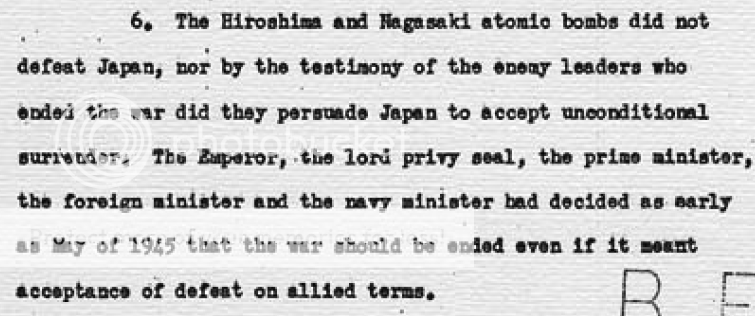Bertster7 wrote:
I'm not really interested in what you meant to imply. I'm interested in what you said. You said they didn't give any terms - which they did.
So your not interested in debate, just in proving me wrong on technicalities. Congratulations, I hope you feel really big now.
Berster7 wrote:
You've asked for sources on stuff and you've been given them - only to change what you're asking for a source for after each is provided.
Opinions of irrelevant people are being posted. Proof of Japanese surrender has to be shown to Truman, his line of thinking has to show that he didn't think this was the way to end the war quickly with as few casualties as possible. Between that and a definition of "surrender" that includes the Japanese having messages decoded that indicates they might accept some form of conditional surrender...these sources are a joke.
Berster7 wrote:
Here you even talk lots of sense:
Flaming_Maniac wrote:
Oh I have seen the debate on it, but I honestly have not seen (or do not remember) this argument that "the Japanese were in the midst of surrendering and we knew it but we dropped the second bomb anyways."
It seems absurd, and if it were true it pretty much invalidates any other argument at least for the second bomb. I have a really hard time believing it's true.
Evidence has been provided that the Japanese were in the midst of surrendering. They dropped the bomb on Nagasaki in the middle of the Supreme Council meeting where they were voting on whether to surrender ffs. I've also given you quotes from Hirohito which show this to be the case. Numerous quotes from American generals, admirals and other senior military advisors which show that the Americans were aware of this.
I can't find the quotes that you're talking about, help please.
Berster7 wrote:
That makes a strong case (not airtight, but strong) for the whole "the Japanese were in the midst of surrendering and we knew it but we dropped the second bomb anyways." idea.
How difficult is it to surrender immediately when you clearly have the lives of thousands on the line? In the midst of surrendering...we already dropped a
nuclear weapon on them with the clear, written intention to continue to do so and they couldn't raise a white flag in time?
Berster7 wrote:
Despite your protestations he's the only one who matters.
LOL YOU WROTE THAT WRONG I DON'T CARE WHAT YOU MEANT I WIN HAHAHA
Berster7 wrote:
Truman is not relevant to this. Despite your protestations he's the only one who matters. American military sources show the US were aware, Japanese sources show the Japanese were in the midst of surrendering. It's a strong case. Dismissing it out of hand is just silly.
Truman is the one who decided to drop both bombs. The only information that matters as far as what should/should not have been done is the intelligence in his hands. Everything else was useless in the formation of the decision.
Berster7 wrote:
The whole idea of Truman dropping the bombs to scare the Russians is completely in line with all the evidence. There are a few diary entries from people at the Potsdam conference with him that support this notion. Nothing concrete, but lots of little bits.
Yeah, and I read a lot of those accounts of the little exchange between Truman and Stalin. It's a conspiracy theory.
You want the US Government to be the bad guy, and you're making yourself an armchair general with the benefit of 20/20 to make your case. You are lost on all the reason that validates the second bomb as a rational decision made by a fallible person in a shitty situation because you would rather it be a nefariously calculated decision by a powerful government. Fact is there is a lot of stupid and/or evil done by every government, but tactically relevant and arguably humanistic decisions made in war time do not fit that description.
